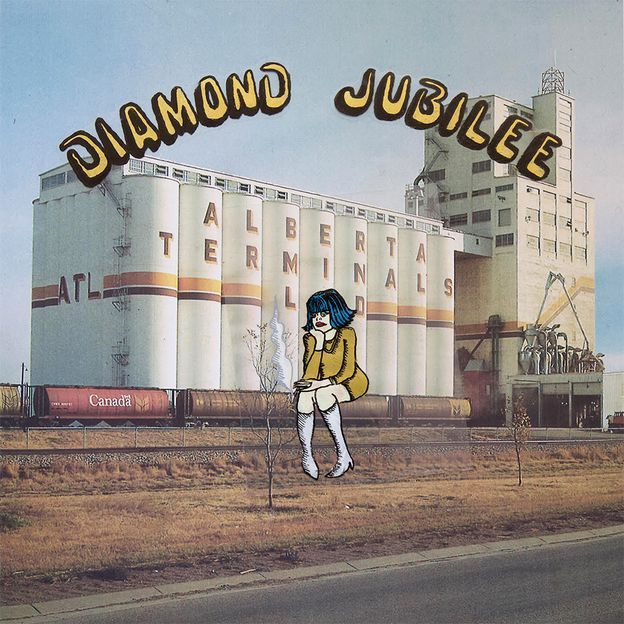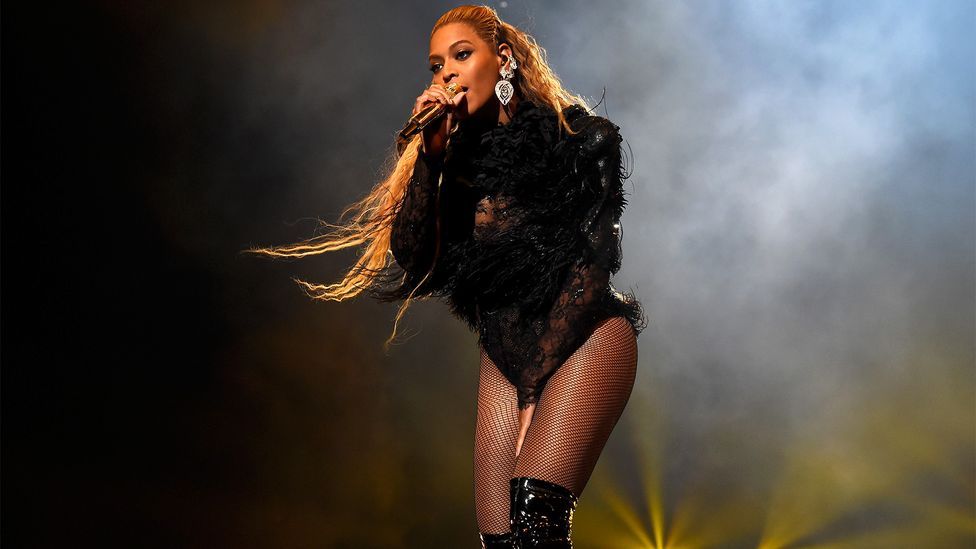Who is Cindy Lee? Pop's most mysterious sensation
BBC Culture feature
March 7, 2025

People were also eagerly scrambling to find out: who exactly is Cindy Lee anyway? There was no PR campaign, no interviews, and no social media presence. In fact, as it transpired, it was the enigmatic drag alter ego of alternative Canadian singer-songwriter Patrick Flegel, whose band Women had been a combustible but admired act in the 00s indie rock scene, releasing two acclaimed albums before splitting after an onstage fistfight.
Flegel began their Cindy Lee project in 2012. It was shortly after their first live performance, playing bass in a friend's band, in their now trademark drag look: beehive wig, gold or silver sequined dresses, knee-high boots and fur coat. "In the context of modern drag, the way I do drag is so tame, conventional, basic, and traditional," they said in a rare 2020 interview. "I'm like, 60s closet queen drag... [in] a tradition of diva archetypes like Patsy Cline, Tammy Wynette, Diana Ross." The music and the look weren't matched in any particularly deliberate way, Flegel also explained in another 2022 interview. "They didn't really have anything to do with each other initially," he said, "they just kind of blended together. But that's kind of a long game thing, where it's not just some idea that I wrote down on paper – it's just my life."
How the hype built
Flegel's previous six albums as Cindy Lee had made little imprint: Diamond Jubilee's grand unorthodoxy could have been another hard sell. But switched-on music fans discovering the album couldn't get enough. As old-school word-of-mouth hype built, internet forums such as Reddit were awash with praise; the YouTube comment section was unanimously effusive ("This is one of the best albums I've heard in a decade. Wow" read a typical post). "There was a certain air of mystery to it that made it feel unique," says Steven Hyden, an author and music critic who co-hosts Uproxx's indie rock podcast Indiecast. "That added to the allure. It really feels like a mixtape of songs that might have been hits 40 or 50 years ago, but no one has heard yet. That was the quality that a lot of people responded to. And even though Patrick did have this history in indie rock, there was a feeling like it came out of nowhere."
Cindy Lee does lean into that desire that some music fans have to go back to how things used to be, when they could find an album and really dig into it, rather than constantly jump to the next one – Aly Gillani
When, last October, a more conventional download was made available to buy on Bandcamp, an online record store and music community that connects independent artists with loyal, paying fans, it proved incredibly popular; then a couple of weeks ago, it was finally given a physical release on vinyl and CD. "Pretty instantly it was one of the biggest selling items on the site," says Aly Gillani, Bandcamp's European Artist and Label Representative and founder of independent label First Word Records. "It's sold very well, and continues to."
It has been helped along by vociferous praise from the online US music press; one site, Aquarium Drunkard, called Diamond Jubilee "a throwback to a different, weirder, cooler, better era in independent music". Leading online magazine Pitchfork gave the album a score of 9.1, their highest for a new album in four years, propelling Cindy Lee forward in a way reminiscent of the site's taste-making 00s heyday, when its reviews habitually helped break indie acts like Arcade Fire. Meanwhile The Guardian voted Diamond Jubilee the second best album of 2024, behind only Charli xcx's cultural behemoth and dance-pop masterpiece Brat.
There was something incongruous about seeing Diamond Jubilee and Brat side by side. Brat was the epitome of a 21st Century album, with a very 21st Century album campaign: aggressively marketed and cleverly hyper-self-aware, its domination of online discourse via memes and viral social media moments worked so well that its branding reached Kamala Harris. Diamond Jubilee, on the other hand, has rejected almost all prevailing theories about how music should be sold and consumed in the modern era, prompting a debate on wider music industry practices and the fan-artist relationship that goes far beyond the record itself.

The album Diamond Jubilee has been hailed for its inventive genre-bending and throwback vibes (Credit: Superior Viaduct)
For a certain type of music fan – highly engaged and record buying – the act of discovery was a huge part of Diamond Jubilee's appeal, not to mention the commitment needed to source and then digest Flegel's ambitious artistic vision. "It does lean into that desire that some music fans have to go back to how things used to be," Gillani says, "when they could find an album and get excited and really dig into it, rather than constantly jump to the next one. There's a yearning from people to experience great artistry directly."
"People felt like they were getting in on the ground floor in a way that you don't get much on the internet these days," Hyden says. "And with a feeling this record wasn't being shoved down people's throats by social media or labels or corporate media, it all combined to make it feel like it was a special event, although still a niche event."
The power of shunning the promo trail
Of course, artists finding different ways to sell and promote their music is nothing new. From Beyoncé surprise-dropping 2013's self-titled fifth album to Jack White's rollout of last year's No Name record – White initially gave away unmarked vinyl copies in plastic bags to unwitting customers in his Third Man Records shops – an inventive approach can ignite a campaign. "If you're a larger artist with a platform, you can afford to take risks that maybe smaller artists can't," Gillani says, while adding, nevertheless, that unknown musicians can sometimes use an off-kilter release strategy to powerful effect.
Gillani points to secretive London neo-soul collective Sault, who for years never confirmed their identify, also refused interviews and once simultaneously made five albums available for free download in a five-day window. "Both Cindy Lee and Sault did things you would not necessarily advise," Gillani says, "and it definitely helped that the music is exceptional. But as a music fan, that captures my imagination. And doing something like that can be a really effective way of bypassing all of the things that you quote unquote 'have' to do to release music."
You would hope that people would take from Diamond Jubilee that not everything that there is to be heard is on streaming platforms – Steven Hyden
The theory goes that if people have to work harder to hear something, it is more rewarding. "You want people to connect with it on an emotional level," Gillani says. "And I think by creating some barriers to that, yes, it's a risk, because they might not get through the barriers. But if they do, that emotional connection is doubled, tripled. That's hard to beat." And despite what it may look like, Gillani insists Diamond Jubilee was indeed marketed. "It's a high-risk strategy, absolutely, but it is still a strategy nonetheless."
Though it's not one you see often in our oversharing, content-saturated online world: an artist giving the impression they're not fussed if their music is heard or not. Expensive PR campaigns with a strong social media presence are the norm for artists desperately vying for our attention. "Back in the 80s and 90s, artists weren't brazenly chasing clout in a way they do now," Hyden says. "I'm not blaming artists now for chasing clout, because we're in an environment where you're just trying to have your music heard through a huge trough of content online. But Patrick not chasing that was a throwback."

Beyoncé is among the more mainstream artists who have played around with release strategy (Credit: Getty Images)
Flegel's rejection of streaming – they once stated on their website about Spotify CEO Daniel Ek that "[HE] IS A THIEF AND A WAR PIG" – taps into a growing debate about the state of the music industry, and the economics of streaming in particular (one can only imagine what Flegel thought when an illegal upload of Diamond Jubilee was suddenly available on Spotify, only to be quickly taken down). On top of a worldwide cost-of-touring crisis – a new survey by Ditto Music states that 84% of UK independent artists can no longer afford to tour – smaller artists who have seen physical sales decline now see next to no financial reward from streaming. Spotify reportedly pays between $0.003 - $0.005 per stream, which is then split between all rights holders (which could include labels and publishers as well as artists).
While the advantages for users are obvious – cost and convenience – it has seen the work of artists devalued. "Spotify has become a pretty inhospitable place for artists who don't get a lot of streams," Hyden says. "People treat Spotify like it's Netflix. And it's like, if the movie isn't on Netflix, then the movie doesn't exist. There's an illusion that that's the whole world. You would hope that people would take from Diamond Jubilee that not everything that there is to be heard is on streaming platforms. There's a lot of artists that operate outside of that because they choose to."